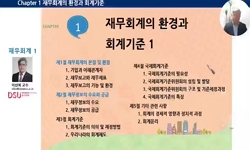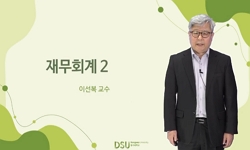This paper examines whether the relation between auditor switch and earnings management in Korea has changed after the mandatory adoption of IFRS (i.e., the post-IFRS period) compared to before the IFRS adoption period (i.e., the pre-IFRS period), and...
http://chineseinput.net/에서 pinyin(병음)방식으로 중국어를 변환할 수 있습니다.
변환된 중국어를 복사하여 사용하시면 됩니다.
- 中文 을 입력하시려면 zhongwen을 입력하시고 space를누르시면됩니다.
- 北京 을 입력하시려면 beijing을 입력하시고 space를 누르시면 됩니다.

IFRS 도입 전후 감사인 교체와 이익조정에 관한 연구 = A Study on the Auditor Changes and Earnings Management under Pre- and Post-IFRS
한글로보기https://www.riss.kr/link?id=A101795696
- 저자
- 발행기관
- 학술지명
- 권호사항
-
발행연도
2016
-
작성언어
-
- 주제어
-
KDC
300
-
등재정보
KCI등재
-
자료형태
학술저널
- 발행기관 URL
-
수록면
299-344(46쪽)
-
KCI 피인용횟수
5
- 제공처
-
0
상세조회 -
0
다운로드
부가정보
다국어 초록 (Multilingual Abstract)
This paper examines whether the relation between auditor switch and earnings management in Korea has changed after the mandatory adoption of IFRS (i.e., the post-IFRS period) compared to before the IFRS adoption period (i.e., the pre-IFRS period), and whether the direction of the auditor switch (i.e., from or to the Big 4 auditors) has affected those changes. Previous literature documents that before the adoption of the IFRS (i.e., during the K-GAAP period) the discretionary accruals increase in the year that a firm changes its auditor (Park and Kwak 2007) compared to a firm that keeps its auditor. Other studies report that the discretionary accrual level in general has decreased in Korea after the IFRS adoption (Park et al. 2013; Kim 2014; Chung and Kim 2014; Jeon et al. 2014). However, no study has yet attempted to find evidence regarding the influence of the IFRS adoption on the relation between auditor switch and earnings management. To fill this gap, we investigate this issue with all listed firms excluding those in the finance industry over the 4-year period before and after the IFRS adoption between 2007 and 2014 (equivalent to 10,902 firm-year observations). Among total sample, 1992 firm-year observations that change auditors are defined as the auditor-change firms while the remaining 8,910 observations that do not change auditors are defined as the auditor-retention firms. Also, among the auditor-change firms, 787 observations change the auditors in the pre-IFRS period and the rest (1,205 observations) switch in the post-IFRS period. A firm’s earnings management activity is estimated by discretionary accruals in the main analysis and by real activity (i.e., RM) in the additional analysis. Major findings of this study are as follows. Firstly, we do not observe a significant increase in discretionary accruals in auditor-change firms compared to those without an auditor switch (i.e., auditor-retention firms) over the whole period from 2007 to 2014 (10,902 observations), which is inconsistent to the results in Park and Kwak (2007) who use the pre-IFRS period only (2000-2005). However, when we split the sample period into the pre-IFRS period (2007-2010) and the post-IFRS period (2011-2014), we find that auditor-change firms report greater discretionary accruals than auditor-retention firms in the post-IFRS period than in the pre-IFRS period. Secondly, among the auditor-change firms, those changing from the Big 4 auditors to the non-Big 4 auditors show higher level of discretionary accruals than those switching in reverse regardless of the period. Lastly, additional test reveals that auditor-change firms are more likely to have lower level of earnings management through real activity (i.e., RM) compared to auditor-retention firms throughout the whole sample period. However, we do not observe any evidence on a significant difference in the RM level of auditor-change firms and that of auditor-retention firms between the pre-IFRS period and the post-IFRS period. This result implies that to increasing the reported earnings, the auditor-change firms tend to resort to discretionary accruals rather than to RM in the year of the auditor switch compared to the auditor-retention firms.
참고문헌 (Reference)
1 나종길, "회계발생액과 차별적 감사수요" 한국회계학회 28 (28): 1-32, 2003
2 박종성, "차별적 감사수요와 자발적 감사인 교체" 한국회계학회 26 (26): 1-25, 2001
3 이아영, "지배주주의 지분구조와 실제이익조정- 소유권과 소유지배괴리도를 중심으로 -" 한국회계학회 37 (37): 157-189, 2012
4 김지홍, "적자 회피 및 이익 평준화를 위한 실제 이익조정 활동" 한국회계학회 17 (17): 31-63, 2008
5 최 관, "유상증자기업의 이익조정에 관한 실증적 연구" 24 (24): 1-27, 1999
6 김성혜, "외국인투자자의 특성과 실제이익조정- 외국인대주주의 역할을 중심으로" 한국회계학회 37 (37): 129-165, 2012
7 안윤영, "외국인투자자와 정보비대칭 간의 관계" 한국회계학회 30 (30): 109-131, 2005
8 김문태, "외국인의 지분참여가 이익관리의 크기와 방향에 미치는 영향" 한국회계정보학회 22 (22): 85-112, 2004
9 박종일, "실제 이익조정과 신용위험 간의 관계에 관한 연구: 유가증권상장과 코스닥상장기업을 중심으로" 2012
10 김진배, "실제 영업활동을 통한 이익조정과 시장반응" 한국경영학회 38 (38): 1185-1211, 2009
1 나종길, "회계발생액과 차별적 감사수요" 한국회계학회 28 (28): 1-32, 2003
2 박종성, "차별적 감사수요와 자발적 감사인 교체" 한국회계학회 26 (26): 1-25, 2001
3 이아영, "지배주주의 지분구조와 실제이익조정- 소유권과 소유지배괴리도를 중심으로 -" 한국회계학회 37 (37): 157-189, 2012
4 김지홍, "적자 회피 및 이익 평준화를 위한 실제 이익조정 활동" 한국회계학회 17 (17): 31-63, 2008
5 최 관, "유상증자기업의 이익조정에 관한 실증적 연구" 24 (24): 1-27, 1999
6 김성혜, "외국인투자자의 특성과 실제이익조정- 외국인대주주의 역할을 중심으로" 한국회계학회 37 (37): 129-165, 2012
7 안윤영, "외국인투자자와 정보비대칭 간의 관계" 한국회계학회 30 (30): 109-131, 2005
8 김문태, "외국인의 지분참여가 이익관리의 크기와 방향에 미치는 영향" 한국회계정보학회 22 (22): 85-112, 2004
9 박종일, "실제 이익조정과 신용위험 간의 관계에 관한 연구: 유가증권상장과 코스닥상장기업을 중심으로" 2012
10 김진배, "실제 영업활동을 통한 이익조정과 시장반응" 한국경영학회 38 (38): 1185-1211, 2009
11 윤순석, "상장기업과 코스닥기업의 이익관리에 대한 비교 연구" 29 (29): 57-85, 2001
12 박종일, "비정상 감사보수와 이익조정 -비상장기업을 중심으로-" 한국세무학회 14 (14): 73-121, 2013
13 최종서, "비상장 중소기업의 발생액 및 실물활동을 통한 이익조정실태" 한국회계학회 19 (19): 37-76, 2010
14 박종일, "기업지배구조와 이익조정: 최대주주 지분율을 중심으로" 한국회계학회 28 (28): 135-172, 2003
15 이만우, "기업의 투자기회가 자기주식 취득에 미치는 영향" 한국회계학회 30 (30): 27-46, 2005
16 박현영, "국제회계기준 도입 전·후 이익조정과 감사투입시간의 영향에 대한 연구" 한국공인회계사회 54 (54): 529-565, 2012
17 손성규, "교체를 앞둔 감사인의 특성" 한국공인회계사회 (42) : 269-289, 2005
18 김영화, "거래소 및 코스닥 상장 기업의 이익조정과 가치관련성" 한국회계정보학회 27 (27): 255-272, 2009
19 김선미, "감사품질과 감사인 강제교체 및 자율교체" 한국공인회계사회 (51) : 227-256, 2010
20 정석우, "감사인변경이 재량적 발생액에 미치는 영향" 3 (3): 93-116, 2002
21 권혜진, "감사인 유지제도 하에서의 회계법인 교체기업과 비교체기업의 이익조정 차이" 한국세무학회 11 (11): 297-324, 2010
22 박종일, "감사인 교체와 감사품질" 한국공인회계사회 (46) : 191-226, 2007
23 신근식, "감사인 교체와 감사인의 보수적 회계감사" 한국공인회계사회 56 (56): 179-211, 2014
24 전규안, "감사시간이 국제회계기준의 도입효과에 미치는 영향" 6 (6): 1-29, 2014
25 Dechow, P. M., "The relation between earnings and cash flows" 25 (25): 133-168, 1998
26 Choi, A, "The joint effect of audit quality and legal regime on the use of real versus accrual-based earnings management: International evidence" 2011
27 Doukakis, L. C, "The effect of mandatory IFRS adoption on real and accrual-based earnings management activities" 33 : 551-572, 2014
28 Healy, P. M., "The effect of bonus schemes on accounting decisions" 7 (7): 85-107, 1985
29 Becker, C. M, "The effect of audit quality on earnings management" 15 (15): 1-24, 1998
30 DeFond, M. L., "Smoothing income in anticipation of future earnings" 23 (23): 115-139, 1997
31 Kim, J. B., "Real earnings management and cost of capital" 32 (32): 518-543, 2013
32 Kim, Y. T., "Real ativities manipulation and auditors’ client-retention decisions" 89 (89): 367-401, 2014
33 Chow, C., "Qualified audit opinions and auditor switching" 57 (57): 326-335, 1982
34 Watts, R, "Positive Accounting Theory" Prentice-Hall 1986
35 Kothari, S. P., "Performance matched discretionary accrual measures" 39 (39): 163-197, 2005
36 Kasznik, R, "On the association between voluntary disclosure and earnings management" 37 (37): 57-82, 1999
37 정재을, "K-IFRS도입과 적자회피동기가 이익조정에 미치는 영향" 한국국제회계학회 (54) : 60-81, 2014
38 김경태, "K-IFRS 제도 변경이 이익조정에 미치는 영향 : 감사법인 규모를 중심으로" 한국공인회계사회 56 (56): 117-146, 2014
39 Chi, W., "Is enhanced audit quality associated with greater real earnings management?" 25 (25): 315-335, 2011
40 Dye, R. A, "Informationally motivated auditor replacement" 14 (14): 347-374, 1991
41 Lopez, T., "Identifying tax-induced earnings around TRA 86 as a function of prior tax-aggressive behavior" 20 (20): 37-56, 1998
42 Scholes, M. S., "Firms’ response to anticipated reductions in tax rates : The tax reform act of 1986" 30 (30): 161-185, 1992
43 DeFond, M., "Factors related to auditor-client disagreements over income-increasing accounting methods" 9 (9): 415-431, 1993
44 Degeorge, F., "Earnings management to exceed thresholds" 72 (72): 1-33, 1999
45 Burgstahler, D., "Earnings management to avoid earnings decreases and losses" 24 (24): 99-126, 1997
46 Roychowdhurry, S, "Earnings management through real activities manipulation" 42 (42): 335-370, 2006
47 Guenther, D. A, "Earnings management in response to corporate tax rate changes : Evidence from 1986 tax reform act" 69 (69): 230-243, 1994
48 Jones, J. J, "Earnings management during import relief investigations" 29 (29): 193-228, 1991
49 Teoh, S., "Earnings management and the post-issue performance of seasoned equity offerings" 50 : 63-99, 1998
50 Ashbaugh, H., "Do non-audit services compromise auditor independence? Further Evidence" 78 (78): 611-639, 2003
51 Sohn. B. C., "Do auditors care about real earnings management in their audit fee decision?" City University of Hong Kong 2011
52 Dechow, P. M., "Detecting earnings management" 70 (70): 193-225, 1995
53 DeFond, M. L., "Debt covenant effects and the manipulation of accruals" 17 (17): 145-176, 1994
54 강선아, "Consequences of Real Activity based Earnings Management: Evidence of Seasoned Equity Offering Firms in Korea" 한국경영학회 39 (39): 595-632, 2010
55 강선아, "Characteristics of Firms Engaged in Real activity based Earnings anagement: Evidence from Korea" 한국회계학회 35 (35): 35-70, 2010
56 Davidson III, W. N., "Causes and consequences of audit shopping: An analysis of auditor opinions, earnings management, and auditor changes" Southern Illinois University 2005
57 DeFond, M., "Auditor changes and discretionary accruals" 25 (25): 35-67, 1998
58 Krishnan, J, "Auditor Switching and Conservatism" 69 (69): 200-215, 1994
59 Teoh, S., "Are accruals during an initial public offering opportunistic?" 3 : 175-208, 1998
60 Holthausen, R., "Annual bonus schemes and the manipulation of earnings" 19 (19): 29-74, 1995
61 Trueman, B., "An explanation for accounting income smoothing" 26 (26): 127-139, 1988
62 Dhaliwal, D., "An analysis of the economic factors related to auditor-client disagreements preceding auditor changes" 12 (12): 22-37, 1993
63 Cohen. D., "Accrual-based and real earnings management activities around seasoned equity offerings" 50 (50): 2-19, 2010
64 Schwartz, K, "Accounting changes by corporations facing possible insolvency" 6 (6): 32-43, 1982
동일학술지(권/호) 다른 논문
-
재무이익-세무이익간의 일시적 차이 구성항목의 내용과 지속성
- 한국회계학회
- 고종권 ( Jong Kwon Ko )
- 2016
- KCI등재
-
이익조정기업과 조세회피기업의 이익지속성과 이익의 시장반응에 관한 연구
- 한국회계학회
- 홍영도 ( Youngdo Hong )
- 2016
- KCI등재
-
이익조정 측정모형으로서 발생액모형과 수익모형의 적합성, 검정력 비교연구
- 한국회계학회
- 안치현 ( Chihyoun Ahn )
- 2016
- KCI등재
-
순영업자산의 증가와 회계적 왜곡, 그리고 발생액의 지속성
- 한국회계학회
- 이세용 ( Se-yong Lee )
- 2016
- KCI등재
분석정보
인용정보 인용지수 설명보기
학술지 이력
| 연월일 | 이력구분 | 이력상세 | 등재구분 |
|---|---|---|---|
| 2027 | 평가예정 | 재인증평가 신청대상 (재인증) | |
| 2021-01-01 | 평가 | 등재학술지 유지 (재인증) |  |
| 2018-01-01 | 평가 | 등재학술지 유지 (등재유지) |  |
| 2015-01-01 | 평가 | 등재학술지 유지 (등재유지) |  |
| 2011-01-01 | 평가 | 등재학술지 유지 (등재유지) |  |
| 2009-01-01 | 평가 | 등재학술지 유지 (등재유지) |  |
| 2007-01-01 | 평가 | 등재학술지 유지 (등재유지) |  |
| 2004-01-01 | 평가 | 등재학술지 선정 (등재후보2차) |  |
| 2003-01-01 | 평가 | 등재후보 1차 PASS (등재후보1차) |  |
| 2001-07-01 | 평가 | 등재후보학술지 선정 (신규평가) |  |
학술지 인용정보
| 기준연도 | WOS-KCI 통합IF(2년) | KCIF(2년) | KCIF(3년) |
|---|---|---|---|
| 2016 | 0.99 | 0.99 | 1.25 |
| KCIF(4년) | KCIF(5년) | 중심성지수(3년) | 즉시성지수 |
| 1.35 | 1.43 | 2.629 | 0.29 |




 KISS
KISS




